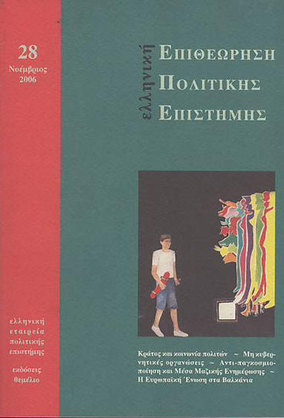Επαναπροσδιορίζοντας τις σχέσεις Ρωσίας-Ευρώπης στον μετα-Ψυχροπολεμικό κόσμο : προς μια νέα σύγκρουση ή προς την ανάδυση μιας συνεργασίας;
Part of : Ελληνική Επιθεώρηση Πολιτικής Επιστήμης ; No.12, 1998, pages 57-80
Issue:
Pages:
57-80
Parallel Title:
Redefining Russia's relationship with Europe in the post-Cold War world : towards a new confrontation or towards the emergence of co-operation?
Author:
Abstract:
This article examines Russia’s relationship with Europe, the content and parameters of which have always been extremely complicated, in the post-Cold War era. After addressing the problématique of the contentious and much- debated question of whether Russia belongs to Europe and rejecting the acceptance of a fundamental dualism in Europe, it goes on to briefly examine the emerging, after the collapse of the Manichean Cold War structure, European order. It argues that the fact that the major geopolitical equations in Europe have changed creates new challenges and opens new prospects for Russian-European relations. These relations will be profoundly influenced by developments in Russia’s international and domestic setting. Especially in the domestic setting, the importance of economic reforms and of the domestic debate over Russia’s national interests are outlined. It is argued that because of the Soviet legacy the Russian economy cannot transcend, in a single bound, the vast chasm between anti-market economic system and the desired goal of radial transformation into a market-based system. As regards the domestic discourse on foreign policy, it is argued that Russian thinking on its place in the world falls into three main categories: the «Westemizers», who think of Russia as a part of a common European home; the Russian nationalists, who reject close relations with the West, are dissatisfied with Russia’s current secondary status and consider its reconst-ruction as a great power a priority task; and the «Euro-Asianists», who balance between East and West and regard Russia as having a special mission of building a bridge between western and eastern civilizations while remaining distinct from both. This polarization is most likely to remain for many years to come, and thus the pendulum of Russia’s European policy will continue to swing. As the pattern of future Russian-European relations is by no means settled, the final step of this article is an attempt to examine two scenarios (confrontation and co-operation) for the future. It concludes that, unfortunately, it is too early to put aside the confrontational scenario. Indeed, the uncertain situation in Russia tends to predetermine the vagueness of its future with Europe, but deterministic considerations that present the outcome of the transition process as a priori contradictory with the notion of normalized Russian-European relations could become a self-fulfilled prophecy.
Subject:
Subject (LC):
Keywords:
διεθνείς σχέσεις, Ευρώπη, Ρωσία




